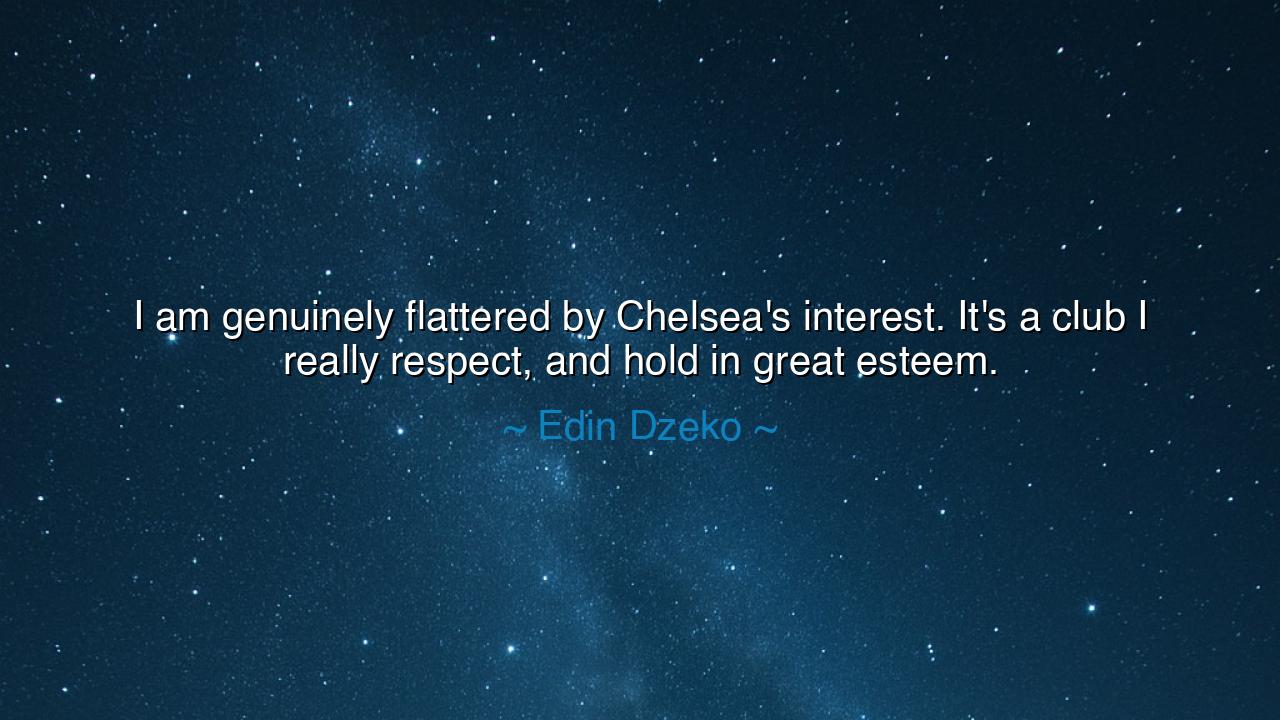
I am genuinely flattered by Chelsea's interest. It's a club I
I am genuinely flattered by Chelsea's interest. It's a club I really respect, and hold in great esteem.






When Edin Džeko said, “I am genuinely flattered by Chelsea’s interest. It’s a club I really respect, and hold in great esteem,” he spoke not only as a footballer, but as a man who understands the sacred weight of honor and respect. His words, though simple, carry the quiet dignity of one who knows that admiration is not weakness, but strength — that to recognize greatness in others is itself an act of greatness. For in a world where pride so often blinds men to humility, Džeko’s statement glows like the calm flame of wisdom: he honors the path of gratitude, even when the winds of ambition blow fiercely around him.
In these words, Džeko reveals a truth that transcends the game itself. He stands as a warrior who, while sought by a mighty club, remembers that respect must always come before conquest. The ancients taught that even the strongest of heroes must bow before that which is noble. In ancient Sparta, when warriors were chosen for the front lines, they did not boast of their worth — they spoke instead of the honor of being chosen. Džeko’s humility echoes that same timeless spirit: he is flattered, yes, but grounded. He knows that to be respected by others is not an entitlement, but a gift — a recognition earned through toil, discipline, and integrity.
The origin of this quote lies in a moment of potential transformation — when Džeko, the Bosnian striker of renown, was linked with a move to Chelsea, one of England’s greatest football clubs. In that season, whispers of transfer filled the air, and journalists sought to capture his response. But instead of arrogance or speculation, he offered grace. He did not shout his worth or demand glory. Instead, he spoke with esteem — acknowledging the stature of the club that courted him. His words reveal the character of a man who remembers his beginnings: a boy who once played among the ruins of Sarajevo, rising from hardship to the grand stages of Europe. To him, respect was not a performance — it was remembrance.
There is an ancient story of Alexander the Great that mirrors this spirit. After conquering a vast empire, Alexander met the Indian philosopher Diogenes, who lived simply, content in the sun. When Alexander asked what he could offer him, Diogenes replied, “Stand out of my sunlight.” Instead of anger, Alexander admired his courage, saying, “If I were not Alexander, I would wish to be Diogenes.” Both men — one a conqueror, the other a sage — found respect in one another’s greatness, though they walked different paths. So too, Džeko’s words to Chelsea are not those of a servant to a master, but of equals recognizing one another’s worth. It is the same ancient truth: greatness honors greatness.
Džeko’s humility, however, does not come from weakness. It is the strength of one who knows his own value so deeply that he does not need to shout it. In an age where fame tempts many to arrogance, his tone stands as a reminder that dignity is the highest form of power. He honors his suitor not to flatter, but to affirm that respect must always dwell at the heart of human connection — even in competition. The ancients would have called this aretē — the virtue of excellence guided by moral balance. A man who respects his rivals, his peers, and his craft is already victorious, no matter the field of battle.
From Džeko’s words, we may draw a lesson for our own lives: to meet admiration with humility, and opportunity with gratitude. When someone honors your skill, do not meet it with pride, but with grace. When the doors of greatness open before you, walk through them not as one who conquers, but as one who is called. For all things that endure — friendship, art, purpose — are built upon respect. In every pursuit, whether in sport or in spirit, humility is the foundation upon which all true triumphs stand.
So let this be the teaching: Honor what honors you. Respect what is noble, even when it stands beside you or across from you. In doing so, you preserve the harmony of greatness — the circle that binds those who strive toward excellence. Just as Džeko bowed in respect to Chelsea’s legacy, so too must we bow to the greatness we encounter in others, knowing that admiration does not diminish us — it refines us. For in the end, the soul that respects remains unbroken, and the man who honors others walks forever in the light of his own integrity.






AAdministratorAdministrator
Welcome, honored guests. Please leave a comment, we will respond soon